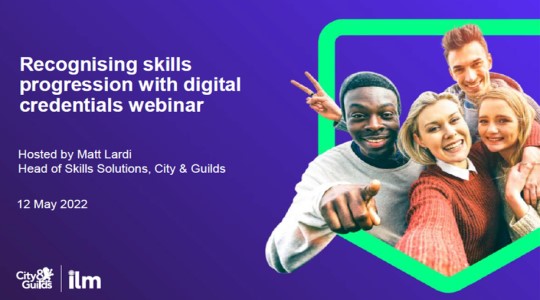Recognising skills progression with digital credentials
Alexandra O’Connor, Senior Manager – Service Design & Delivery at City & Guilds, reflects on the recent Progressing Skills through Digital Credentials webinar and the key insights from the session.
17 May 2022

In May 2022, we were delighted to host a webinar dedicated to unpacking the power of digital credentials, and to give attendees an inside look into how these credentials work.
The event was hosted by our Head of Skills Solutions, Matt Lardi, who opened the discussion by stating, “We ran a customer poll two years ago, and 60% of participants were not even aware of what digital credentials were. Digital credentials are not new. They’ve been around for over 15 years. We’re working hard to raise awareness of how powerful they are, so it’s great to see from today’s poll that the awareness has increased significantly”.
Matt was joined by Colin McCarthy from Waterford Wexford Training Services, and a number of City & Guilds colleagues, to share their experiences and insights.
- Colin McCarthy – Training Standards Officer, Waterford Wexford Training Services
- Matt Rogers – Service Delivery Manager, City & Guilds
- Jason Benn – Industry Manager for Hospitality & Catering, City & Guilds
- Naz Lewis-Humphrey – Industry Manager for Construction & Infrastructure, City & Guilds
More than just a badge – what is a digital credential?
Perhaps the most common misperception of a digital credential is that it’s simply a badge that a learner receives.
Matt Lardi explained that a digital credential is in fact “packed with information”, and that behind the simple badge lies a world of complex and robust credibility. Taking time to reveal the “meta-data” associated with each digital badge, Matt Lardi illustrated that interested parties including employers may access detailed information about a candidate’s learning, including:
- Programme / qualification title
- Grade / Level
- Description learning obtained
- Skills obtained
- Earning criteria
- Date of issue
- Date of expiration
- And more…
Digital credentials comprise of documented awards issued by an authorised body, and can include degrees, diplomas, licenses, certificates, badges, and professional or industry-related certifications.
Why should more training providers and employers utilise digital credentialing?
A digital credential isn’t merely for personal display – although it does go a long way to improve motivation and sense of accomplishment.
“Digital credentials are a highly effective retention tool,” said Jason Benn. “We’ve had great success in the hospitality industry – learners are actively sharing their badges, on social media. They’re able to demonstrate measurable progression and show how they’ve gone from developing one skill to the next. They can track their progress, live, on the platform.”
The webinar illustrated that when facilitated through a reputable issuing body, each digital credential can link through to job vacancy opportunities, where employers are more likely to be seeking individuals whose skills are verified by the credential itself. And through advanced skills tagging on the credential meta data, finding and recruiting a perfect match on skills that matter becomes far easier, and more cost-effective.
Speaking of digital credentials in the construction industry, Naz Lewis-Humphrey commented, “Construction is issuing more and more digital credentials because of the nature of the industry. With vast workforces who move between sites, contractors who move between projects. Paperless certification safely stored digitally is the solution that makes the most sense, for all sectors.”
The various benefits of digital credentials can’t be overlooked.
For employers and candidates:
- Digital credentials are used to enhance and, in some cases, replace traditional CV’s.
- Digital credentials allow recruiters to verify a candidate’s qualifications, through detailed meta-data endorsed by the awarding body.
- They help organisations of all sizes recognise achievements and put measurable value behind learning. This creates a culture of recognition, also enabling employers to see the accomplishments of their most committed and engaged employees.
- Employers that implement recognised training enjoy higher retention rates. This is further enhanced by digital credentialing, where the qualifications awarded carry far more weight than a certificate on a piece of paper.
- Learners are able to apply to have their past paper-issued qualifications converted to digital credentials, which ensures the safety of their learning and working records, on one digital space.
For training providers:
- Modern learners benefit more from digital credentials, due to the various logistical and recruiting benefits of moving away from traditional, paper certificates.
- Become a training provider of choice, by helping employers translate learning opportunities into hard-to-fill vacancies.
- Digital credentials help to reduce the admin time associated with traditional certificate awarding, through innovative systems that create and distribute learner badges in minutes.
- They also allow training providers to verify learners’ existing qualifications, so as to reduce potential fraud.
In closing, Matt Rogers gave a real-time demonstration of how a digital credential is accepted and shared, and how through the digital credential itself, job opportunities can be found.
The City & Guilds digital credential journey
City & Guilds invested in a robust digital credential service provider in 2016 – through the acquisition of DigitalMe, we’ve been able to support thousands of learners as they build a portable and verifiable record of their learned skills.
We have continued to grow our digital credentialing services, making the benefits of credentials available to organisations and our partners who facilitate City & Guilds qualifications. In 2021 alone, we issued over 130,000 credentials, a number that we’re excited to see grow each year.
Learn more about digital credentials – access the full webinar here.
If you would like to talk about City & Guilds’ digital credentials or qualifications, or to schedule a demo for your organisation, please contact our teams.